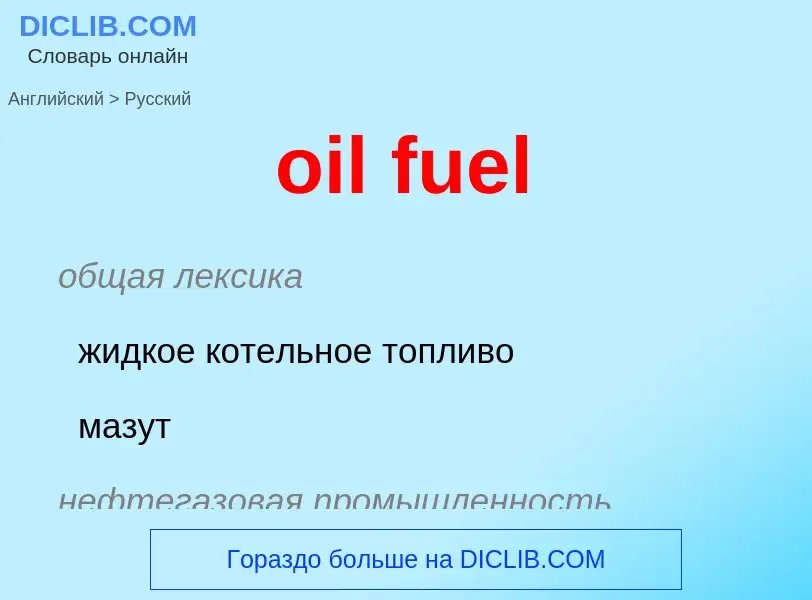Traducción y análisis de palabras por inteligencia artificial ChatGPT
En esta página puede obtener un análisis detallado de una palabra o frase, producido utilizando la mejor tecnología de inteligencia artificial hasta la fecha:
- cómo se usa la palabra
- frecuencia de uso
- se utiliza con más frecuencia en el habla oral o escrita
- opciones de traducción
- ejemplos de uso (varias frases con traducción)
- etimología
oil fuel - traducción al ruso
общая лексика
жидкое котельное топливо
мазут
нефтегазовая промышленность
жидкое топливо, топливная жидкость (нефть, мазут, нефтяное топливо)
общая лексика
мазут
топливная нефть
энергетика
масло горючее
строительное дело
жидкое топливо, топливное масло
нефтегазовая промышленность
жидкое топливо
котельное топливо
топочный мазут
нефтяное топливо
Wikipedia

Fuel oil is any of various fractions obtained from the distillation of petroleum (crude oil). Such oils include distillates (the lighter fractions) and residues (the heavier fractions). Fuel oils include heavy fuel oil, marine fuel oil (MFO), bunker fuel, furnace oil (FO), gas oil (gasoil), heating oils (such as home heating oil), diesel fuel and others.
The term fuel oil generally includes any liquid fuel that is burned in a furnace or boiler to generate heat (heating oils), or used in an engine to generate power (as motor fuels). However, it does not usually include other liquid oils, such as those with a flash point of approximately 42 °C (108 °F), or oils burned in cotton- or wool-wick burners. In a stricter sense, fuel oil refers only to the heaviest commercial fuels that crude oil can yield, that is, those fuels heavier than gasoline (petrol) and naphtha.
Fuel oil consists of long-chain hydrocarbons, particularly alkanes, cycloalkanes, and aromatics. Small molecules, such as those in propane, naphtha, gasoline, and kerosene, have relatively low boiling points, and are removed at the start of the fractional distillation process. Heavier petroleum derived oils like diesel fuel and lubricating oil are much less volatile and distill out more slowly.

![An [[oil tanker]] taking on fuel, or "[[bunkering]]" An [[oil tanker]] taking on fuel, or "[[bunkering]]"](https://commons.wikimedia.org/wiki/Special:FilePath/Bunkering-or-taking-fuel.jpg?width=200)

![A fuel station in [[Zigui County]] on the [[Yangtze]] River A fuel station in [[Zigui County]] on the [[Yangtze]] River](https://commons.wikimedia.org/wiki/Special:FilePath/Zigui-Sinopec-boat-fuel-station-4959.jpg?width=200)
